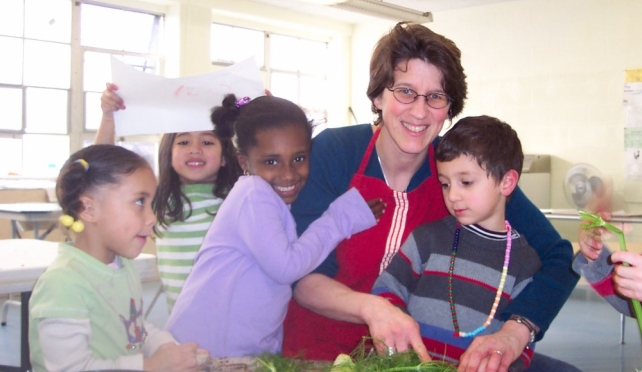By Jill Wrigley
Once upon a time . . .
There was a man named Rev. George Freeman Bragg, an Episcopal priest and civil rights advocate, who was born in slave times but lived free. He saw the many deep needs of his time and in response to the particular need of vulnerable African-American boys in Baltimore City, he co-founded a home and school for them, which in 1912 purchased land west of the city. What was for many years “The Bragg School” was deeded to Baltimore City Schools in the 1950s, lived on as the Bragg Nature Center and eventually was recreated in 2008 as Great Kids Farm to support the effort to create a healthier food culture for students in City Schools.
Once upon a time, more recently:
Elementary school children on a trip to Great Kids Farm gather around a garden bed. The trip leader invites the children to pick and taste the sorrel growing there: Squeals of delight and surprise erupt as the leaves trigger taste buds: “ooooooh. it’s lemony!!”
Kwan, age 10, picks up a shovel as community members gather to build a raised bed for growing vegetables in a former vacant lot. Eight hours later, he breaks his focus on the finished bed, looks up at an adult and, smiling from ear to ear, declares: “I love this work.”
Tyree, age 11, picks off a sprig of cilantro from his schoolyard garden to bring inside for making salsa. His teacher tells him to squeeze it and then smell it. He does and as the fresh herb passes under his nose, he makes a sound of pleasure, mock faints to the ground, and croons “oooh, I’m in love.”
These are stories from real children. Here’s a harsh statistic about their possible future: The Centers for Disease Control predicts that for children born in the year 2000, one in three risks developing diet-related diabetes; one in every two—or 50% of—African-American and Latino children risk getting that debilitating disease.
Here’s a different vision of a possible future, one that is being cultivated at Great Kids Farm and in partnering schools throughout the City.
 Students, teachers and community members experience the pleasure of growing and cooking food out at Great Kids Farm. The Farm supports this growing desire for gardening and cooking with guidance, education and material support. As children and youth learn to cook healthy and delicious meals using produce they have themselves grown, we are all invited to participate in the age-old human practice of forming community through the sharing of food and conversation around a table.
Students, teachers and community members experience the pleasure of growing and cooking food out at Great Kids Farm. The Farm supports this growing desire for gardening and cooking with guidance, education and material support. As children and youth learn to cook healthy and delicious meals using produce they have themselves grown, we are all invited to participate in the age-old human practice of forming community through the sharing of food and conversation around a table.
And it is so that our children—and we—are brought back to wellness – through shared work, engaged learning and the pleasure of our senses.


